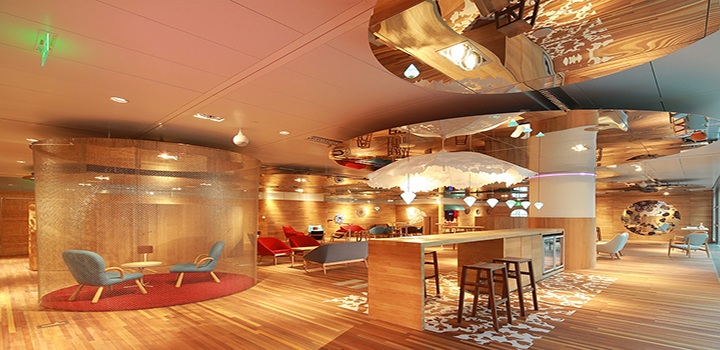Sitting pretty: The business of furnishing China

Haworth’s Beijing showroom, in the landmark Parkview Green building.
Making and selling furniture in China is a tough business, there are over 15,000 registered furniture manufacturers in the world’s factory. And if you want to have a textbook definition of what perfect competition looks like, furniture manufacturing in China is a good example of that.
However, there is a Western company that is making headway in this crowded space and growing its business in a tough environment. Haworth is an American office furniture supplier with operations across the globe, including China and Australia.
China Spectator spoke to Frank Rexach, vice president of the company’s Asia Pacific, Middle East, Africa and Latin America operations, to find out what it’s like to carry coal to Newcastle and make money.
Rexach, who has been running the company’s regional operations from Shanghai, says rule number one is to pursue a “premium” strategy. “If you want to go in and be the lowest cost manufacturer, you will get killed,” he said. “There is no question about it.”
Anybody who is in the middle is going to get eaten from below and we don’t want to be there. We want to be at the top end and that is where you are going to make a difference.”
The company supplies big multinationals in China such as HSBC, Australia and New Zealand Banking Group, Standard Chartered and Microsoft and Chinese "red chip" companies such as ICBC, the world’s largest commercial bank by market capitalisation and Sinopec, a large state-owned oil company. At the moment, about two thirds of its revenue comes from Western companies, and the rest is from Chinese clients.
Rexach says the future growth potential will come from big Chinese companies like Alibaba and Tencent, two of the largest internet companies in the world. “We are really trying to penetrate these companies,” he told China Spectator.
His optimism is based on two large emerging trends: the globalisation of Chinese companies and the increasing brand awareness in the world’s second largest economy. Many of China’s leading firms are going abroad, from mining companies looking for raw materials to tech giants who want to flex their muscles beyond home market.
“I think these companies will end up acquiring a lot of global brands,” he said. “My kids are using WeChat and can’t believe people still use Facebook.” Wechat is one of China’s most popular instant messaging apps, with more than 355 million active users and has recently formed a partnership with Google to expand into the US.
Globalisation of Chinese companies means they also demand more cosmopolitan office space, work environments, and hopefully Haworth's custom-made furniture.
The Chinese office environment is out of sync with China’s increasingly international and upwardly mobile workforce. “They want to have the same cool space that is here in Australia,” he said. “People want to have the freedom to work everywhere, because they are using mobile devices and so you can’t handicap them with this whole cubicle world.”
The broader trend is that the Chinese are becoming increasingly aware of global brands; in fact, they are responsible for about one quarter of global consumption of luxury goods. “People who are buying the real Burberry, Louis Vuitton are Chinese, and we are the one who are buying all the fakes,” he said with laughter.
The key to Haworth’s success in China is about its focus on marketing, quality design and a premium brand image. The company designed and supplied furniture to the players’ lounge at Shanghai Master Tournament, using it as a show room for potential Chinese clients.
Rexach said when the company first went into China, management made a conscious decision not to be a manufacturing-driven company. “We want to be a marketing driven company and we want to add value where our competitors can’t,” he said.
“There is this awareness of brand and there is this appreciation of design,” he said, “they are beginning to see the importance of environment, quality, leather and everything. We are just getting to this wave we are going to catch,” he said.
With rising wages, land prices and other costs of production, many foreign companies in China are talking about the need to relocate to other cheaper places like Southeast Asia, but it not easy to replicate China’s well-developed logistics and infrastructure network.
“Wages are still a small part of the overall product cost,” he said,” the market itself is so big in China and the lead time in our industry is short and we need to manufacture in China.”
















